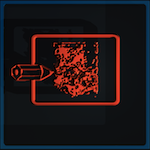The Agents
Gray clouds spat fat drops into the squares of the city, staining the leaf-covered streets with a shining film of grimy water. On a beaten park bench, a man sat motionless in the rain. The heating fibers woven into his over-coat were still working, for the most part, and the quiet of the empty park provided another kind of warmth. From beneath the brim of an old-fashioned hat, a cat face sat atop a heavy body, like a bored old tom, still muscular under a layer of fat. For a moment, the man indulged the illusion that the rain-slicked path was a deep, still pool, lacking only the silent swimming of water birds.
He tried to incorporate the man walking toward him into the scene, a messiah perhaps, but could not maintain the shift in image. Reality returned, edging suddenly closer as the walking man sat down beside him.
“Good morning, Griffin. How are you?”
It had been a long time since he had heard that name, and the cat-faced man took some time to respond, looking up and down the path with a slow, smooth gesture that took in the entire park. He looked at the other man, taking in the gaunt frame and thin hair, the sputtering rain-shield suspended above a crisp, new coat. The thin man knew how to sit, but the frame of the sub-machine gun he carried under his arm was still visible as a specific bulge. When he received no reply, he spoke again.
“Yeah, they’re out there. Two teams, the trees at the north entrance and the rock wall at the east gate.”
Griffin Cho considered the options, running quickly through a list of escapes and attacks. He settled on offering the man his hand.
“You have me at a disadvantage, sir.”
The other man shook his hand carefully, with a firm grip, an additional layer of communication. “My name is Cable Fredericks, and I’m here to bring you in. Peacefully, I hope.”
Griffin could not resist the old joke. “Now?”
The cop played along, although his expression was one of sadness, of fatigue. “Unless you got somewhere else to be.”
There was a time when Griffin Cho would have had the man up by his neck, the machine gun in hand, already spitting rounds at the baffled sniper teams, another miraculous escape. But that time had passed, and Griffin realized that it was the long stretch of empty days that had brought him to the park, the immensity of the passing years like heavy chains. He was worn and slow and uncomfortable on the park bench. And the alternative, another night of tele-dinners and an encounter with his stained quad-deck, was not compelling.
He stood, stretching to his full height despite his surrender. Fredericks stood, too, and pointed toward the gate. “My skimmer’s right outside. I don’t think we need cuffs, right?”
Griffin understood the question, and appreciated the gesture. “No, we don’t need cuffs.” Then, “How’d you find me?”
Fredericks replied, “You’ve got a lot of spare parts, and even though you removed the interface nodes, some of the power supplies are still detectable as unique signatures. It took some luck, but an NSA Broadsword locked on to you about ten days ago.”
Cho remembered learning to use the prosthetics, and the faint embarrassment at discovering the transmitters buried within them. But, of course, he hadn’t considered the power supplies. He walked away from the bench, surprised at his sudden interest in the day ahead.
Even as the sun broke through the fast-moving clouds, the rain fell harder. Damp despite his shield, Cable Fredericks followed the larger man, grateful for his good fortune.
###
The dossier projected on the wall of the interrogation room was both appalling and impressive, depending on your point of view. As part of some of the government’s blackest programs, Griffin had fought with vigor and alacrity, decimating enemy combatants of all types. During open combat, Cho was efficient and extremely lethal. But when the mission got quiet, and the orders disappeared, Griffin Cho was something else, a menace amok, grim and deadly. For those he encountered, Cho was a hungry shark in deep, black water.
But even though Griffin escaped from his handlers, a monster cannot move easily through the world without leaving a few footprints, sometimes bloody and smeared with the haste of attack. Unequipped for complex morality, Cho was a prime candidate for innovative, remorseless crime. And while he lacked the addictive nature that would drive true hunting, his absent conscience made every encounter dangerous.
Cable Fredericks stood beside Griffin with his arms crossed, staring at the projected image as it scrolled across the wall. Another man was pointing at the glowing letters and explaining to Cho the seriousness of the crimes. Cho realized that he had tuned him out completely, though he knew he should be listening carefully.
Fredericks spoke quietly, cutting off the louder man. “We need you.”
The other man objected. “What are you doing? Look at this guy’s sheet. We need to throw him in an atomizer, is what we need to do.”
“That’s enough. We don’t have time for these games.”
The man looked at Griffin, who had not reacted to the exchange. Cho smiled, a mean cat smile, and raised his hands, palms up. Shaking his head, the man crossed his arms and leaned against the wall. Fredericks pulled a chair away from the table and sat down.
“We’re going to take out Native. And we want your help.” He waited until he had Cho’s eye. “We need your help.”
“Why Native?”
The question seemed obvious, but Fredericks had no ready reply. The other man spoke instead, calmer now. “The robots are taking over the belt, and they’re marching under orders from Native.”
Cho asked the other obvious question. “Why me?”
This time, Fredericks had an answer. “There’s no one else like you.”
“You send me in there, what’s to stop me from taking the shuttle and making a run for Triton?
Fredericks answered again. “Because I’m going with you. All you have to do is get me in.”
Griffin spoke, as if to himself. “The man wants to meet Native. Why not?” The laugh that escaped him was a sad, shivery sound, incongruous with the man’s feline confidence. Still smiling, he said, “We can go there right now, but I should tell you, you’re not really their type.”
Fredericks was calm, if not actually nonchalant. “I can handle myself.”
Cho laughed again, a soft sound, and spoke again. “If they find out who you are, they’ll tear you apart.”
###
The auto-pilot in the skimmer was smooth and effective, and the air-car moved through open air without a hint of turbulence. In the cockpit, Fredericks and Cho sat in silence, watching the clouds whistling past the canopy. Cho was the first to speak.
“So, what do you have against robots?”
“Not a thing,” Fredericks replied. “I just don’t want another Bhopal, you know? The mining robots are unique; they have no safety protocols at all. If Native isn’t careful, anti-robot sentiment will be so firmly ingrained in the human psyche that robots everywhere are going to take a beating.”
Cho did not reply, and Fredericks added, “And sometimes, you just have to pick a side, you know?”
Dazzling in the pure sunshine eight miles high, the skimmer moved into the shadow of an immense, hovering air-post, allowing the autonomous machine access to its fuel and data ports. After a moment, manipulator arms secured the ‘car and pulled it into an internal bay.
For three hours, the two men waited aboard the station, finally glimpsing their transport as it penetrated the low altitude haze. With the slowness of all herds, they moved with a group of other travelers toward the docking platform. Huge, curved windows afforded an excellent view of the bulbous vessel as it performed its own mating dance with the docking hardware, finally settling against the cradle as if exhausted by the effort.
###
The trip was uneventful, but tense, rigid with the discomfort of unaccustomed partnership. As powerful as the fusion engines were, the time to Ceres was still twenty-two days at this point in the year, a lot of time to consider the man next to you and wonder what he might do. Cho wondered, from time to time, if he should simply kill the cop and stuff his body in a waste-chute. He thought the man’s small frame would fit. Fredericks wondered if he could trust Cho, not as an ally necessarily, but to do what was expected, what was natural. If asked, he would have given a solemn, honest assurance, but in fact, Fredericks was not aware of the throbbing danger that sat next to him, sometimes laughing his way through a funny holo coming in on the Phobos why-vee. When they finally arrived, the pocked disk of Ceres was a welcome relief, and the novelty of moving under the planetoid’s miniscule gravity was refreshing after three weeks of the transport’s unsteady graviton-mesh.
In the gray-green corridors of Ceres Station, they walked down clean, drab halls, looking for a number-plate like a pair of lost tourists escaped from the Eris boats. Cho finally stopped in front of a door, tapping a finger against a plate that read ’28-118’. “This is the place,” he said.
“This is the room?”
“This is where Native lives.” Cho’s face had lost its humor. The buoyancy of the feckless explorer was gone. The face was sad and serious.
Before Fredericks could say anything, the door opened. Powerful arms took hold of the men and pulled them inside.
Cho and Fredericks stood in front of a group of robots, mostly anthropomorphic mining units. The industrial combine that had met them at the door sealed the portal and moved around the pair, taking up a station near a glowing dais in the center of the floor, the primary processor and memory core of the infamous Native Intelligence. Hundreds of cables snaked around the platform, entering its shell through myriad ports embedded across its surface. Above the dais, a glowing blue sphere pulsed and writhed as a storm of numbers swirled across its surface.
“You should not have come.”
The words came from hidden speakers, but the acoustics were perfectly calculated, and the voice seemed to emanate from the space directly in front of Fredericks’ eyes. This was so unlike the trip he had imagined, a montage of detective work and online tracking that would reveal a juggernaut of evil in need of quick defeat. This was happening too fast. He took some comfort from the fact that he was with Griffin Cho.
The voice spoke again. “Welcome back, General Cho. We’re surprised to see you again so soon.”
Cho smiled, a proud, dangerous cat. Shaking his head, he laughed his quiet laugh. He moved to stand near the dais. He pointed at Fredericks and said, “This was actually his idea.” The tone became a mocking insult. “He’s a cop.”
Cable Fredericks was adapting, but too slowly. This was not the plan at all. This would require something else. He spoke, at last. “Why, Cho? Why set me up like this?”
Cho’s smile faded. He said, “Like you said, I’ve got a lot of spare parts. Probably more machine than human anyway.” And then, a moment of candor. “They’re always nice to me, you know. Not like humans at all. It’s like you said, you have to pick a side.”
From the dais, the voice came into the room again. “Destroy him.”
Cho moved toward Fredericks, raising his hands into a martial pose. His tone was unremarkable. “I’ll try to make it quick.”
Fredericks smiled. “You know, Cho, I saw you fight once, and I think I can take you.”
Cho paused, unable to resist. “When did you ever see me fight?”
“Tunguska.”
Cho laughed. “Cop bullshit. After the sweeps, radiation was too high for organics. I barely made it through that myself. Only machines fought at Tunguska.”
Fredericks was still smiling. “That’s true. Completely true.”
It was not ideal, perhaps, but the detonator ring was there, a screw in device that sat below his left wrist assembly. Pulling the hand free with a gentle tug, he tossed it to Cho.
As the mining units scrambled and the dais flashed its rage, Cable Fredericks turned the ring and activated the explosives buried deep within a shielded container in his chest. For him, it was a matter of one last micro-second, enough time to wonder if he should have tried something else. And, enough time to wonder if this gesture, infinitesimal in the face of rage and hate and jealousy, would be enough to stop the war, if only for a while.


